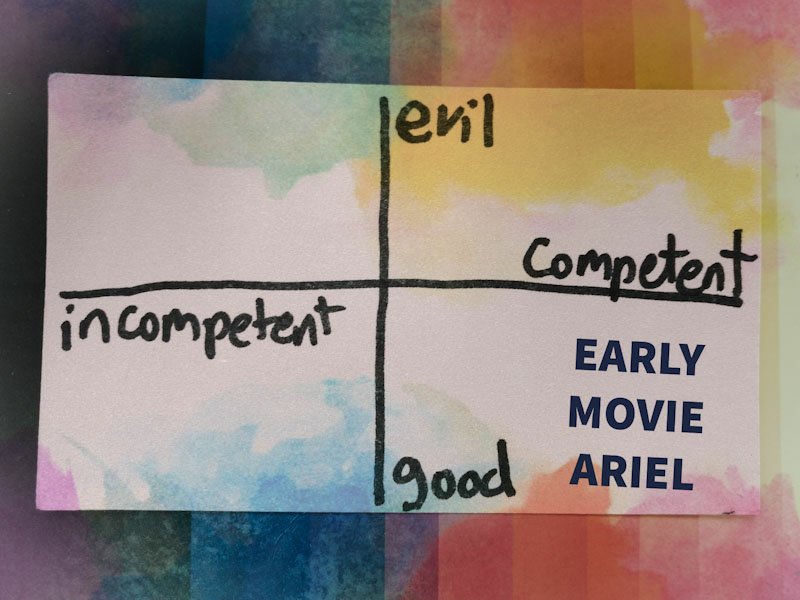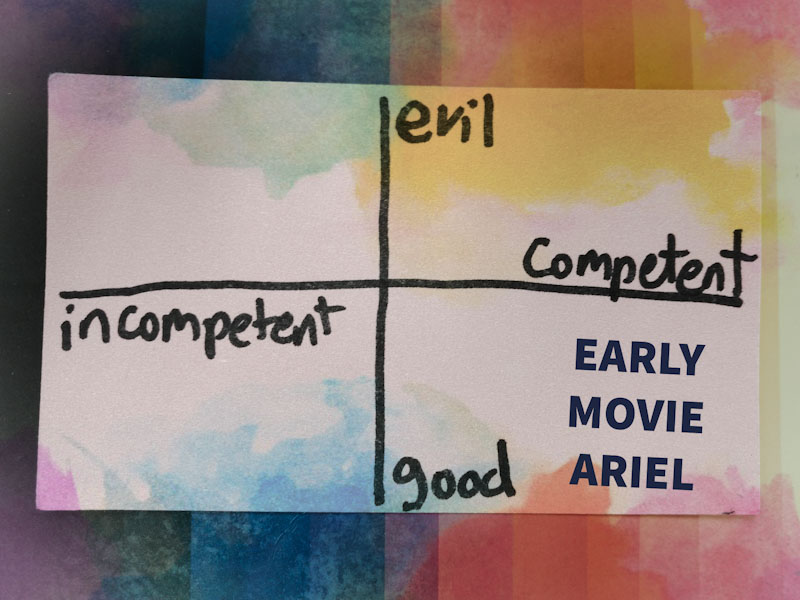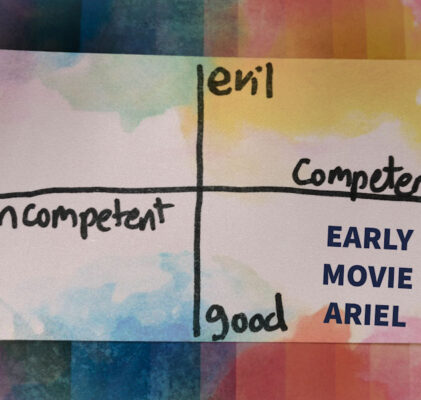When I re-watched The Little Mermaid for the first time in many years, I expected a feminist nightmare with catchy songs, boring characters, and a cookie cutter love story. As I wrote in part one “The Little Badass Mermaid Anthropologist: Why Ariel is Actually Awesome,” I didn’t expect to find Indiana Jones in mermaid form. I loved the rebellious curiosity of Ariel’s character. But the second half of the movie gave me everything bad I had been expecting.
If I were to write a summary sentence, it would be: “When a teenaged mermaid anthropologist seeks to join the human culture she studies against her father’s wishes, a vengeful squid-octopus witch makes her a deal that puts the entire ocean at risk.”
One interesting thing I realized about this movie is that, while Ursula the sea witch is definitely the villain, I’m not sure she’s the antagonist. That honor goes to her father, who works more directly against Ariel’s aims, especially in the early movie. Ariel is basically an anthropologist who wants to join the culture she studies, and Triton is the greatest barrier to this.

As for Ursula herself…
Finally, we have the only other character competent enough to be sharing a movie with Ariel, at least the Ariel we meet at first. If there’s one thing Disney never failed to bring, it was damn good villains. Of either gender. She’s a powerful character. I don’t think I’ve ever heard the name Ursula without thinking of her.
Not only is she a witch of the first order (look at her chuck potion ingredients into her cauldron!), she has what is probably one of the better surveillance systems in the ocean: Flotsam and Jetsam, whose eyes allow the sea witch to see what they see. Can you imagine if Triton had those? 1984 with mermaids.
Also, remember that thing where she’s impaled AND struck by lightning? When I write that out, it sounds like it should be overkill, but somehow it isn’t. She has the presence to make it work.
This is a worthy adversary for Early Movie Ariel, but once Early Movie Ariel encounters Ursula, she becomes Later Movie Ariel. Except, the transformation starts earlier. Things start going downhill for Ariel, and the movie, the instant she lays eyes on Prince Eric.
The Problem with Prince Eric
You have to go as far as real life to find someone else as bougie and boring as Prince Eric. His butler gives him an enormous statue of himself while they’re at sea. In front of all the sailors. In contrast to the Mermaid Version of Indiana Jones, Prince Eric is the one babbling on about marriage.
Loves dogs and the ocean, looking for the perfect girl. Way to be a human dating profile, Prince Eric. To give him some credit, he does impale Ursula with his ship at the end of the movie. But it’s too little too late, and she was being struck by lightning at the same time anyway.
Ariel meets Prince Eric and, just like every horror movie, does not realize how godawful boring he is. Enter the feminist nightmare of a plot in which Ariel agrees to drastically change her body for a guy she just met. Even worse (because at least the legs were a trade and will allow her to learn more about the human culture she loves), she gives up her voice.
I’ve been in a relationship for sixteen years, and as I sit here writing this, I’m still not sure I’d willingly give up my voice and my primary mode of locamotion for my partner. I can even hear him in my head saying, “Don’t do that. It’s dumb.”

This goes further downhill into the kissing plot. Ariel has three days to get Prince Boring to kiss her, but she’s apparently lost her moxie along with her fins and her voice. She tries to be pretty and enticing in the hopes that he will kiss her, but she never tries kissing him. Maybe that was against the rules of the deal and I missed it, but even the sea witch said her in song not to underestimate the importance of body language. This would have been the time for heaving bosoms and general sort of Harlequin romance behavior.
The sea witch will own Ariel forever if she doesn’t make the kiss happen. She will become one of the sentient seaweeds at the bottom of Ursula’s cave. Which means she’ll either get put into some kind of soup recipe*, or she’ll have to watch every single other mermaid who wanders into the cave fall for the same thing. This seems as though it would be greatly motivating.
But even with all that’s at stake for Ariel, she does almost nothing.
There’s even an entire song to convince P. Boring to kiss her, a song which she plays no absolutely no part in making. Instead, she leaves everything to her incompetent babysitter, Sebastian the Crab, whose solution to most problems is to have a musical number at them.**
She’s thrown into a classic love story in which she plays a classic, passive role, and she goes along with it. What happened to Early Movie Ariel, who swam back to a dangerous shipwreck for a bag?
She turned into a lady. And ladies can’t do shit.
Ladies give up their power, their agency, their voice. It’s not that Ariel is silent; it’s that she agreed to be silent.
Ladies wait for their prince to impale the sea witch with a ship instead of doing it themselves. It’s not that she’s powerless; it’s that she’s complicit in her own powerlessness.
Ariel’s last act as an empowered character is to given up her power.
Her transformation so overshadows the tough character of Early Movie Ariel that after all these years, I had forgotten the way she starts out. I realized, in Ariel’s first scene, that this was the character my five-year-old self loved. In a way that I have fully internalized and never let go of, my five-year-old self wanted to BE that character. The exciting rebel geek who cuts class to explore and adventure.
I want the story of Early Movie Ariel to be the story. I want her to impale the sea witch herself. I want her to swim back to Ursula’s lair, smash the amulet containing her voice, and use her vast knowledge of human culture to broker some kind of treaty between Prince Boring and her father. And maybe to depose her father and reopen her underwater museum.
But unlike so many stories in which the character grows, changes, and overcomes inner weaknesses, Ariel’s character development simply cuts off. The story beneath the story beneath the ocean is of Ariel giving up all her agency to become a lady. What she used to be is simply…lost.
Pessimistically, the moral of the story? Never give up your agency. You might get back your voice, but so much else might be gone forever.
Alternately, the moral of the story? Teenagers are stupid. Don’t be one. If you are one, stop that. It may take you seven years, but stop that.
Optimistically, the moral of the story? All feminists have bad days. You do something awesome like keep your name when you get married, but then you continue to shave your legs, or to miss experiences because you didn’t. No one is perfect. No one lives by their ideals all of the time.
That’s Ariel’s story, in the end. We all make compromises. Sometimes they hurt. Ariel is awesome, Ariel is terrible, Ariel is flawed.
That might not be the story Disney set out to tell, but it’s the only way I can reconcile the two halves of this character. My brain keeps wanting to find some way for the disconnect to make sense. To make a story out of it.
*Does kale have more protein if it’s made out of a mermaid? Only genetic engineering can tell.
**I think he gets sick of babysitting and wants to go back to something he’s good at. I find Sebastian the Crab relatable in the same hand-wringing way as C-3PO.


Thanks for writing this great post, I really agreed with the points you made as I was reading and it made me see the movie in a new light.